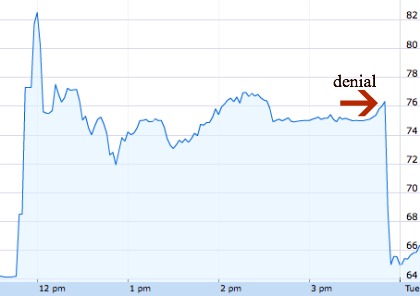Here’s what you like to see if you’re a business reporter with a scoop on a big merger or acquisition:

Here’s what you don’t like to see:

The Wall Street Journal reported at 11:46 this morning that Coca-Cola is in talks to buy Monster Energy to cover its flank in the big and growing energy-drink market. Monster’s shares immediately skyrocketed, jumping 28 percent in less than fifteen minutes, and adding nearly $3 billion to its market cap. The stock traded up 15 percent most of the afternoon.
At 2 o’clock Benzinga says, wait a minute: We broke that story last week. Not so fast, analys guesses don’t count in corporate reporting, and Benzinga’s story didn’t so much as make a ripple in MNST shares on Thursday or Friday.
Then Coke issued a statement at 3:50 denying “media reports” and saying “we are not in discussions to acquire the Monster Beverage Corporation.”
Unsurprisingly, the Journal‘s competitors were quicker to jump on the denial of its scoop than the Journal itself was. The New York Times had a post up within forty minutes reporting Coke’s denial. It didn’t add any fresh reporting from insiders on the deal, though. Forbes rewrote the press release within 20 minutes.
Bloomberg News was even faster. More impressively, it added important new details from its original reporting.
It turns out, according to Bloomberg at 3:59 p.m.—just eight minutes after the Coke denial broke— that Coke had thought about buying Monster “in recent months.” So had Pepsi.
The Journal took its time updating its story, finally reporting Coke’s market-moving denial an hour and forty-five minutes after the company issued it and the stock had given back nearly all of its WSJ-inspired gains. Here’s how the Journal now describes what happened with Coke and Monster today (emphasis mine):
Coca-Cola has been looking for “bolt-on” acquisitions, in the recent words of Coke Chairman and Chief Executive Muhtar Kent. But the company said Monday afternoon that “at this time,” it is not in talks to buy Monster.
Coca-Cola had been in talks to acquire Monster, but decided to walk away after the jump in Monster Beverage’s share price on Monday, which was a reaction to a Wall Street Journal report that the two parties were in discussions, according to people familiar with the matter said. Monster’s market capitalization jumped to more than $13 billion, up $2 billion in Monday trading, although it later slid back to about $11 billion. Coke’s own shares held steady.
On Monday, Coke heard from some angry investors who questioned the idea and the price, a reaction that gave Coke pause, according to a person familiar with the matter.
This is sort of a Heisenberg Uncertainty Principle defense. The WSJ is saying its story was right but that the impact of its scoop was such that it ended up nixing any possibility of a deal.
Well, maybe. But lots of deals leak out before they are consummated, and you’d expect the premium of any deal to be based on the pre-news price of the company (unless another company swoops in with a higher bid). Fifteen percent, the increase in Monster shares at the time of Coke’s denial, is actually a fairly small takeover premium. The arbitrage traders piling into the stock would have expected a few points more, but to me, the relatively low number implies that Coke already wasn’t interested in Monster at the pre-WSJ price.
The Journal did cover itself somewhat in the original story by noting that “Coca-Cola may ultimately decide that Monster Beverage’s price is too high for a deal.” But the question is whether its original report—that Coke is in talks to acquire Monster—was correct. That’s a lot different than “Coke held talks with Monster months ago; decided it was too expensive.”
Which is what what Bloomberg reports in a later update to its original report referenced above (emphasis mine):
Monster shopped itself to Coca-Cola and PepsiCo Inc. (PEP) a year ago, and both beverage companies passed on an acquisition, citing the cost of a deal, said a person familiar with the matter. A few months ago, Coca-Cola and Monster spoke again about a deal, said the person, who asked not to be named because the talks were private. Coca-Cola again decided Monster was too expensive and pressed to start talks about an expanded partnership that could lead to a small stake sale to Coca-Cola, said the person.
Somebody’s wrong. It’s either Bloomberg, its “person familiar with the matter,” and Coke’s PR department or it’s the Journal and its “people familiar with the matter.” That anonymous sourcing, standard issue in M&A reporting, makes it much harder for readers, investors, and media critics to determine who’s amiss.
But the market, for what it’s worth, is betting it’s the Journal.
Ryan Chittum is a former Wall Street Journal reporter, and deputy editor of The Audit, CJR’s business section. If you see notable business journalism, give him a heads-up at rc2538@columbia.edu. Follow him on Twitter at @ryanchittum.
